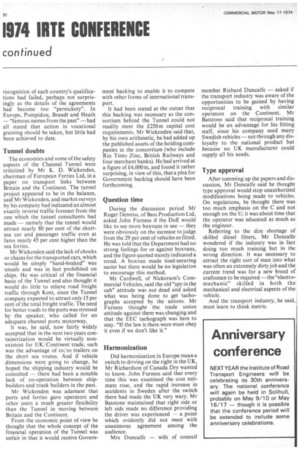1974 IRTE CONFERENCE
Page 32

If you've noticed an error in this article please click here to report it so we can fix it.
continued
recognition of each country's qualifications had failed, perhaps not surprisingly as the details of the agreements had become too "pernickety". In Europe, Pompidou, Brandt and Heath — "famous names from the past" — had all stated that action in vocational graining should be taken, but little had been achieved to date.
Tunnel doubts
The economics and some of the safety aspects of the Channel Tunnel were criticized by Mr K. D. Wickenden, chairman of European Ferries Ltd, in a paper on transport links between Britain and the Continent. The tunnel project appeared to be in the balance, said Mr Wickenden, and market surveys by his company had indicated an almost exactly reverse traffic forecast from the one which the tunnel consultants had made — namely that the tunnel would attract nearly 80 per cent of the shortsea car and passenger traffic even at fares nearly 45 per cent higher than the sea ferries.
Mr Wickenden said the lack of chocks or chains for the transported cars, which would be simply "hand-braked" was unsafe and was in fact prohibited on ships. He was critical of the financial basis of the Tunnel and also thought it would do little to relieve road freight traffic through Kent, since the Tunnel company expected to attract only 15 per cent of the total freight traffic. The need for better roads to the ports was stressed by the speaker, who called for an adequate channel ports motorway.
It was, he said, now fairly widely accepted that in the next two years containerization would be virtually nonexistent for UK/ Continent trade, such was the advantage of ro/ro trailers on the short sea routes. And if vehicle dimensions were going to change, he hoped the shipping industry would be consulted — there had been a notable lack of co-operation between shipbuilders and truck builders in the past.
Mr Wickenden was adamant that ports and ferries gave operators and other users a much greater flexibility than the Tunnel in moving between Britain and the Continent.
From the economic point of view he thought that the whole concept of the financial operation of the Tunnel was unfair in that it would receive Govern ment backing to enable it to compete with other forms of international transport.
It had been stated at the outset that this backing was necessary as the consortium behind the Tunnel could not readily meet the £250m capital cost requirements. Mr Wickenden said that, by his own arithmetic, he had added up the published assets of the holding companies in the consortium (who include Rio Tinto Zinc, British Railways and four merchant banks). He had arrived at a figure of £4,000 m, and found it rather surprising, in view of this, that a plea for Government backing should have been forthcoming.
Question time
During the discussion period Mr Roger Denniss, of Bass Production Ltd, asked John Furness if the DoE would like to see more boxvans in use — they were obviously on the increase to judge from the 29 per cent of vehicles so fitted. He was told that the Department had no strong feelings for or against boxvans, and the figure quoted merely indicated a trend. A boxvan made load-securing easier but there would be no legislation to encourage this method.
Mr Cardwell, of Nickerson's Commercial Vehicles, said the old "spy in the cab" attitude was not dead and asked what was being done to get tachographs accepted by the unions. Mr Furness thought the trade union attitude against them was changing and that the EEC tachograph was here to stay. "If the law is there were must obey it even if we don't like it."
Harmonization
Did harmonization in Europe mean a switch to driving on the right in the UK, Mr Richardson of Canada Dry wanted to know. John Furness said that every time this was examined the cost estimate rose, and the rapid increase in accidents in Sweden after the switch there had made the UK very wary. Mr Batstone maintained that right side or left side made no difference providing the driver was experienced a point which evidently did not meet with unanimous agreement among the audience.
Mrs Duncalfe — wife of council member Richard Duncalfe — asked if the transport industry was aware of the opportunities to be gained by having reciprocal training with similar operators on the Continent. Mr Batstone said that reciprocal training would be an advantage for his fitting staff, since his company used many Swedish vehicles — not through any disloyalty to the national product but because no UK manufacturer could supply all his needs.
Type approval
After summing up the papers and discussion, Mr Duncalfe said he thought type approval would stop unauthorized modifications being made to vehicles. On regulations, he thought there was too much emphasis on the C and not enough on the U; it was about time that the operator was educated as much. as the engineer.
Referring to the dire shortage of skilled diesel fitters, Mr Duncalfe wondered if the industry was in fact doing too much training but in the wrong direction. It was necessary to attract the right sort of man into what was often an extremely dirty job and the current trend was for a new breed of craftsman to be required — the "electromechanic" skilled in both the mechanical and electrical aspects of the vehicle.
And the transport industry, he said, must learn to think metric.








































































































